民航客舱服务英语--unit 7
- 格式:ppt
- 大小:596.50 KB
- 文档页数:22


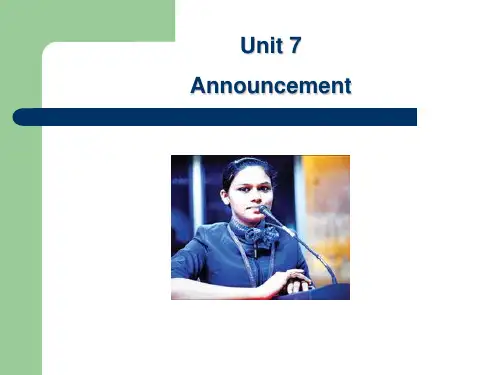
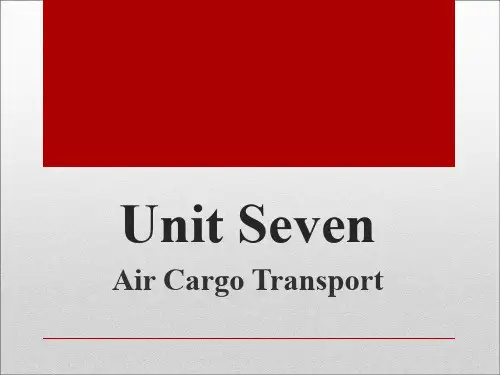
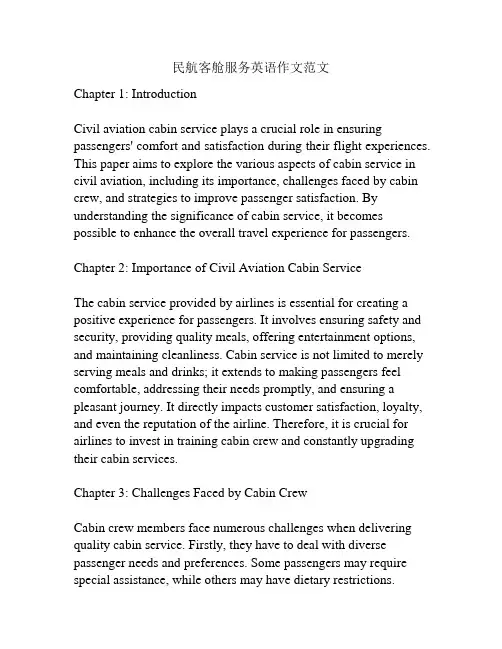
民航客舱服务英语作文范文Chapter 1: IntroductionCivil aviation cabin service plays a crucial role in ensuring passengers' comfort and satisfaction during their flight experiences. This paper aims to explore the various aspects of cabin service in civil aviation, including its importance, challenges faced by cabin crew, and strategies to improve passenger satisfaction. By understanding the significance of cabin service, it becomes possible to enhance the overall travel experience for passengers.Chapter 2: Importance of Civil Aviation Cabin ServiceThe cabin service provided by airlines is essential for creating a positive experience for passengers. It involves ensuring safety and security, providing quality meals, offering entertainment options, and maintaining cleanliness. Cabin service is not limited to merely serving meals and drinks; it extends to making passengers feel comfortable, addressing their needs promptly, and ensuring a pleasant journey. It directly impacts customer satisfaction, loyalty, and even the reputation of the airline. Therefore, it is crucial for airlines to invest in training cabin crew and constantly upgrading their cabin services.Chapter 3: Challenges Faced by Cabin CrewCabin crew members face numerous challenges when delivering quality cabin service. Firstly, they have to deal with diverse passenger needs and preferences. Some passengers may require special assistance, while others may have dietary restrictions.Additionally, cabin crew must manage conflicts among passengers and handle emergency situations effectively. Moreover, cabin crew often work long hours, deal with jet lag, and face challenging working conditions. All these factors make the job of cabin crew demanding and require them to possess excellent interpersonal and problem-solving skills.Chapter 4: Strategies to Improve Passenger SatisfactionTo enhance passenger satisfaction, airlines can implement several strategies. Firstly, airlines should ensure that their cabin crew members receive comprehensive training to enhance their service skills. This includes training in communication, conflict resolution, and emergency response. Secondly, airlines should regularly upgrade their onboard facilities to meet passengers' expectations. For example, providing comfortable seating, modern entertainment systems, and offering a variety of high-quality meals can significantly improve the overall travel experience. Lastly, airlines should take passenger feedback seriously and make necessary improvements based on suggestions received. This will demonstrate that the airline values its passengers' opinions and strive to enhance their experience.In conclusion, civil aviation cabin service plays an integral role in ensuring passengers' comfort and satisfaction during their travel experience. By understanding the importance of cabin service, exploring the challenges faced by cabin crew, and implementing strategies to improve passenger satisfaction, airlines can elevate the overall travel experience for passengers. This will result in increased customer loyalty and positive word-of-mouth, ultimatelybenefiting the airline's reputation.Chapter 5: Training and Development for Cabin CrewComprehensive training and development play a significant role in equipping cabin crew with the necessary skills and knowledge to provide excellent cabin service. Airlines should invest in implementing training programs that cover various aspects, including safety procedures, customer service, communication skills, and conflict resolution. These training programs should be conducted regularly to keep cabin crew updated with the latest industry standards and best practices.To ensure the effectiveness of training programs, airlines can use a combination of theoretical and practical training methods. Theoretical training can be conducted in classrooms or online platforms to provide cabin crew with the necessary knowledge about emergency procedures, regulatory requirements, and passenger service. Practical training can be conducted in simulated environments, such as mock cabins or emergency evacuation drills, to enhance cabin crew's ability to handle real-life situations efficiently.Additionally, airlines should focus on developing cabin crew's interpersonal skills. Effective communication and conflict resolution skills are crucial for cabin crew to address passenger needs, manage conflicts among passengers, and handle challenging situations. Training programs can include role-playing exercises and scenarios to help cabin crew practice their communication and problem-solving skills.Chapter 6: Enhancing Onboard FacilitiesTo improve passenger satisfaction, airlines should continuously upgrade their onboard facilities. This includes investing in comfortable seating arrangements, spacious legroom, and adjustable headrests to ensure passengers have a pleasant and comfortable journey. Airlines should also provide a variety of entertainment options, such as in-flight movies, music, and games, to cater to different passenger preferences.Moreover, the quality of onboard meals is an important aspect of cabin service. Airlines should consider offering a wide range of meal options to accommodate different dietary preferences and restrictions. Collaborating with renowned chefs or partnering with local food establishments can further enhance the quality of onboard meals.Maintaining cleanliness and hygiene onboard is another crucial factor in improving passenger satisfaction. Airlines should establish rigorous cleaning protocols and ensure that cabin crew members regularly clean and disinfect the cabin. Additionally, providing amenities such as blankets, pillows, and personal hygiene products can contribute to a more pleasant journey for passengers.Chapter 7: Listening to Passenger FeedbackOne of the most effective ways to improve cabin service and enhance passenger satisfaction is to listen to their feedback. Airlines should encourage passengers to provide feedback throughvarious channels, such as online surveys, feedback forms, or social media platforms. This feedback can provide valuable insights into areas that require improvement and help airlines identify trends and patterns.Airlines should take passenger feedback seriously and use it as a basis for making necessary improvements. This can include addressing specific issues raised by passengers, implementing changes suggested by them, or introducing new services based on their preferences. Regular communication with passengers, such as through newsletters or email updates, can also help keep them engaged and informed about any enhancements or changes made to the cabin service.Chapter 8: ConclusionEnhancing cabin service in civil aviation requires a holistic approach that encompasses training and development for cabin crew, upgrading onboard facilities, and actively listening to passenger feedback. By investing in comprehensive training programs, airlines can equip cabin crew with the necessary skills and knowledge to provide excellent service. Upgrading onboard facilities, such as seating arrangements, entertainment options, and meal quality, can significantly improve passenger satisfaction. Lastly, actively listening to passenger feedback and making necessary improvements based on their suggestions will demonstrate that the airline values customer opinions and aims to provide an exceptional travel experience.By implementing these strategies, airlines can elevate the overalltravel experience for passengers, resulting in increased customer loyalty, positive word-of-mouth, and a strong reputation in the industry. Cabin service is not just about serving meals and drinks; it is about creating a comfortable and memorable experience for passengers throughout their journey.。
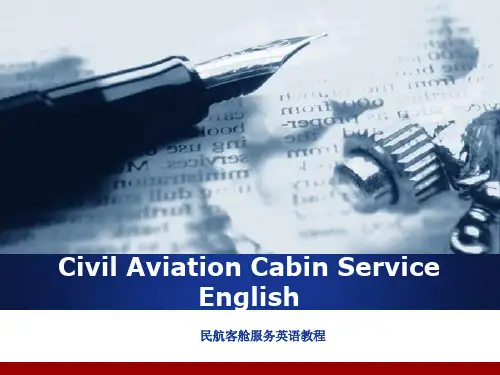

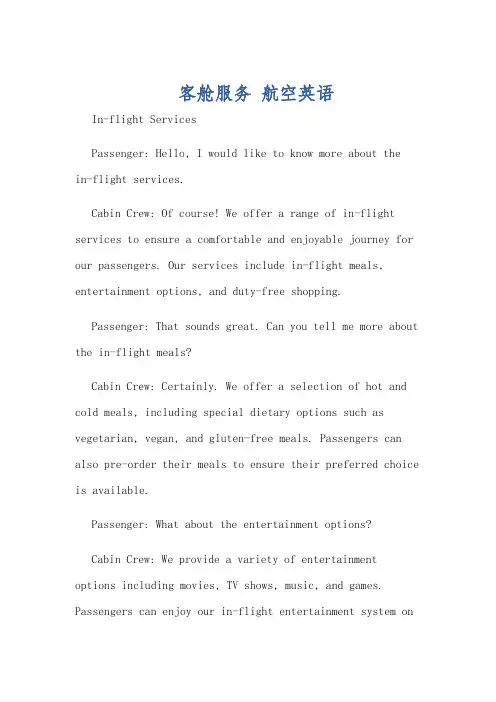
客舱服务航空英语In-flight ServicesPassenger: Hello, I would like to know more about thein-flight services.Cabin Crew: Of course! We offer a range of in-flight services to ensure a comfortable and enjoyable journey for our passengers. Our services include in-flight meals, entertainment options, and duty-free shopping.Passenger: That sounds great. Can you tell me more about the in-flight meals?Cabin Crew: Certainly. We offer a selection of hot and cold meals, including special dietary options such as vegetarian, vegan, and gluten-free meals. Passengers can also pre-order their meals to ensure their preferred choice is available.Passenger: What about the entertainment options?Cabin Crew: We provide a variety of entertainment options including movies, TV shows, music, and games. Passengers can enjoy our in-flight entertainment system onpersonal screens or through our Wi-Fi network on their own devices.Passenger: That's good to know. And what about duty-free shopping?Cabin Crew: We have a duty-free shopping catalogoffering a range of products including cosmetics, fragrances, jewelry, and electronics. Passengers can make their purchases during the flight and have them deliveredto their seats.Passenger: Thank you for the information. Now, can I ask about the in-flight service in Chinese?空乘人员:当然可以!我们提供一系列的客舱服务,以确保乘客在旅途中享受舒适愉快的体验。

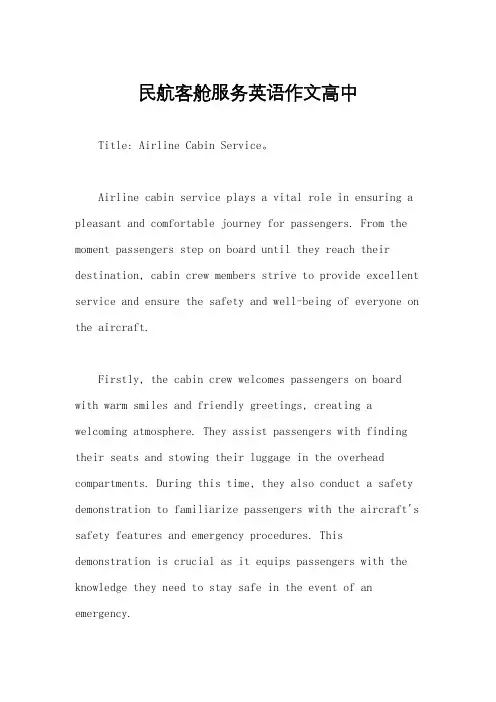
民航客舱服务英语作文高中Title: Airline Cabin Service。
Airline cabin service plays a vital role in ensuring a pleasant and comfortable journey for passengers. From the moment passengers step on board until they reach their destination, cabin crew members strive to provide excellent service and ensure the safety and well-being of everyone on the aircraft.Firstly, the cabin crew welcomes passengers on board with warm smiles and friendly greetings, creating a welcoming atmosphere. They assist passengers with finding their seats and stowing their luggage in the overhead compartments. During this time, they also conduct a safety demonstration to familiarize passengers with the aircraft's safety features and emergency procedures. This demonstration is crucial as it equips passengers with the knowledge they need to stay safe in the event of an emergency.Once the flight takes off, the cabin crew springs into action to cater to the passengers' needs. They offer beverages and snacks, taking into account any dietary restrictions or preferences that passengers may have. Additionally, they provide blankets, pillows, and other amenities to ensure passengers are comfortable throughout the flight. For long-haul flights, they may also offer meal services, serving delicious and satisfying meals to keep passengers energized during their journey.Apart from attending to the passengers' physical needs, cabin crew members also prioritize their emotional well-being. They are trained to handle various situations with professionalism and empathy, whether it's comforting a nervous flyer or assisting a passenger who is feeling unwell. Their reassuring presence helps to alleviate any anxiety or discomfort that passengers may experience during the flight.Moreover, cabin crew members play a crucial role in maintaining order and discipline on the aircraft. Theyenforce safety regulations and ensure that passengersfollow instructions, especially during critical phases of the flight such as takeoff and landing. In the event of any disturbances or conflicts among passengers, they intervene promptly and diplomatically to resolve the situation and restore peace onboard.Furthermore, cabin crew members are trained to handle emergency situations calmly and efficiently. They undergo rigorous training programs that equip them with the skills and knowledge to respond to various emergencies, such as medical emergencies, onboard fires, or unruly passengers. Their ability to remain composed under pressure and take decisive action can make all the difference in ensuring the safety and well-being of everyone onboard.In conclusion, airline cabin service is an essential aspect of the air travel experience, and cabin crew members play a crucial role in delivering high-quality service to passengers. From providing comfort and assistance to ensuring safety and security, cabin crew members perform their duties with professionalism, dedication, and acommitment to excellence. Their efforts contribute to making each flight a safe, comfortable, and enjoyable journey for passengers around the world.。

未办理座位再确认的处理——民航英语之七S: International Reservations. May I help you?销售:这里是国际预订部,请问能帮您什么?P: Well, I have this reservation on your flight 656 to Tokyo tomorrow morning. I’d like to know if it’s OK.顾客:我预订了明天下午的656次航班到东京,想确认一下座位。
S: May I have your name, please?销售:请提供下您的姓名。
P: My name is Mary Smith,顾客:我叫Mary Smith。
S: Have you reconfirmed your reservation, Ms. Smith?销售:Smith女士,请问您确认过预订吗?P: No, Is it necessary? I made my return reservation in Tokyo one week ago.顾客:没有,必须确认吗?这是我一周前在东京预订的回程。
S: International travelers are required to reconfirm their reservations at least 72 hours prior to departure if they stay lasts more than 3 days.销售:国际旅行者需要提前72小时确认航班预订,如果停留时间大于三天。
P: What do you mean by that?顾客:那是什么意思呢?S: I’m sorry, Ms. Mary. The flight 656 on tomorrow is completely reserved. Your reservation was cancelled because you failed to reconfirm it.销售:对不起,Mary女士。
客舱服务的英语作文Title: The Essence of Cabin ServiceCabin service, an integral part of the aviation industry, is a blend of professionalism, attention to detail, and a warm, personalized touch. It involves catering to the needs of passengers, ensuring their comfort and safety throughout the flight.At the heart of cabin service lies the cabin crew, who are trained to handle various situations with utmost professionalism and efficiency. From pre-flight preparations to in-flight service and post-flight cleanup, they work tirelessly to ensure a smooth and enjoyable journey for passengers.Pre-flight, the cabin crew meticulously checks the cabin for cleanliness and safety. They ensure that seats are properly aligned, safety equipment is in place, and all amenities are stocked and ready. This attention to detail sets the tone for a pleasant flying experience.During the flight, the cabin crew's role becomes even more crucial. They greet passengers with a warm smile and attend to their every need, whether it's serving meals, providing drinks, or assisting with in-flight entertainment.They also keep a close eye on passenger safety, ensuring that all safety procedures are followed.Beyond the basic service, the cabin crew strives to create a personalized experience for each passenger. They observe and anticipate needs, offering additional assistance when required. This personalized touch makes the flight more enjoyable and memorable for passengers.Post-flight, the cabin crew's work continues as they tidy up the cabin, ensuring that it's ready for the next flight. This diligent effort ensures that the cabin remains in pristine condition, ready to welcome new passengers.In conclusion, cabin service is a multifaceted and demanding job that requires a blend of skills and a passion for serving others. The cabin crew, with their dedication and commitment, play a pivotal role in making the flying experience a pleasant one for passengers.。